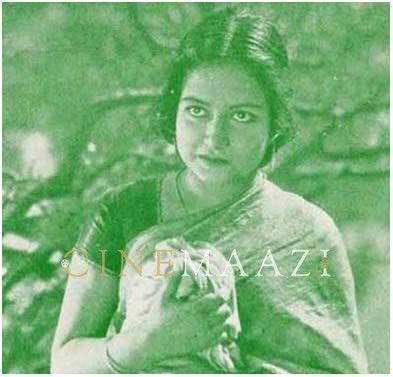Umasashi

Subscribe to read full article
This section is for paid subscribers only. Our subscription is only $37/- for one full year.
You get unlimited access to all paid section and features on the website with this subscription.
Not ready for a full subscription?
You can access this article for $2 , and have it saved to your account for one year.
- Born: 1915 (Calcutta, British India)
- Died: 6 December 2000 ((Kolkata)
- Primary Cinema: Bengali
- Parents: Radharani and Nilmani Chattopadhyay
- Spouse: Guru Prasad Deb
- Children: Gouranga Narayan, Soumendra Narayan, Sourendra Narayan, Kanaklata Narayan
Veteran Bengali actress Umasashi, one of the earliest stars of New Theatres’ studio, Calcutta, featured in silent films as well as talkies between 1929 and 1951. She is known for films such as Dena Paona (1931), Kapal Kundala (1933), Chandidas (1934) and Anath Ashram (1937). Onscreen she formed a popular pair with actors like Durgadas Bannerjee, K L Saigal, Pahari Sanyal and Prithviraj Kapoor.
She was born in 1915 into a poor Brahmin family of Calcutta to mother Radharani and father Nilmani Chattopadhyay who hailed from Dacca, East Bengal, British India but was settled in Calcutta. Her father was a kirtan artist and sometimes performed in a local jatra group. Owing to the family’s poverty, she did not receive much formal education as a child; however, she was trained in music and dance from approximately age four as it offered an easier route to earn money for the impoverished family. Satkari Ganguly, her first teacher in music and dance, introduced her to the stage, where she started work as a group dancer. She worked in Minerva, Alfred and finally in Russa Theatres. She went on to play minor roles in theatre and soon became part of a touring group from Calcutta performing on stage in different parts of undivided Bengal like Chittagong, Cox's Bazar, etc.
As part of her training, she had also received elocution lessons from tutors in Hindi, Urdu and English to perfect her pronunciation of these languages
Her break in films came when she was working with Russa Theatres. The silent film Bangabala (1929), her debut film, saw her play a character named Subarna. She would, however, have to quit the stage as the authorities would not allow their paid staff to work in films. More work in films followed, namely the silent films Bigraha (1930) where she played Ranima, and Abhishek (1931).
Her singing career saw her recording songs for Columbia. Later, when she transitioned to doing sound films, she shifted to Hindustan Musical Products where she remained their exclusive singing artiste. In the gramophone records for both Columbia and Hindustan, she was credited as Smt. Uma Devi.
The Premankur Attorthy Bengali directorial Dena Paona (1931) would be her first sound film. She acted in a crowd scene and also sang a song Baba apan bhola moder pagal chhele along with Miss Abhabati. She had been trained for the song by Pankaj Kumar Mallick.
Securing her first lead role, she made her impact the following year, playing a character named Rami in New Theatres’ Chandidas (1932), which revolved around the legendary 15th century Bengali Vaishnavite poet. With her portrayal of the suffering Rami, she carved a permanent place for herself on the Bengali screen and also came to be recognised as a major leading lady of New Theatres.
Featuring in Hindi films, she soon became known to the rest of India. Her Hindi language filmography include the Hindi version of Chandidas (1934) which featured well-appreciated songs like her duet with K L Saigal - Prem nagar mein. She would go on to act in major films such as Vishnumaya (1932), Roop Lekha (1934), Bhagya Chakra (1935), Dhoop Chhaon (1935), Daku Mansoor (1934), Desher Mati (1938), Puran Bhagat (1933), Kapalkundala (1933), Bhagyachakra (1935), Anath Ashram (1937) and Dharti Mata (1938). She worked opposite some of the leading actors of the day.
She also rendered songs for her films such as Kapal Kundala (1933), Chandidas (1934), Maya (1936), Anath Ashram (1937) and Desher Mati (1938).
In 1939, she married Guru Prasad Deb of the Sovabazar Rajbari, an attorney by profession. It was the culmination of a long courtship. At the time, social acceptance for an actress was not to be easily gained and she had to wait for a considerable period of time before she was allowed into the ancestral house of the conservative Deb family. At the time, she was still under contract with New Theatres; however, she received the permission and blessing of the studio’s proprietor B N Sircar to move out of the glamour world and settled down to marital bliss. As her husband was already married, she shared the home of her husband and his first wife. In time, she became the mother of three sons Gouranga Narayan, Soumendra Narayan and Sourendra Narayan and a daughter Kanaklata.
She stayed away from the film world for the rest of her life though, at an advanced age, she did give interviews to the print and the electronic media and occasionally even attended a few film functions. One of her first public appearances was at a BFJA award function, where she was the chief guest. In the year 2000, she received the Hero Honda award as the oldest living film legend.
Her last days were not very comfortable. Suffering from the effects of a fractured hip bone, she developed complications and passed away on 6 December 2000. Her daughter Kanaklata had predeceased her and she was survived by her sons and their families. The news of her death appeared in the newspapers days after she had passed as her family did not want any publicity.
With her passing, a precious link with the past was snapped.
-
Filmography (1)
SortRole
-
Bangabala 1929
-







.jpg)



